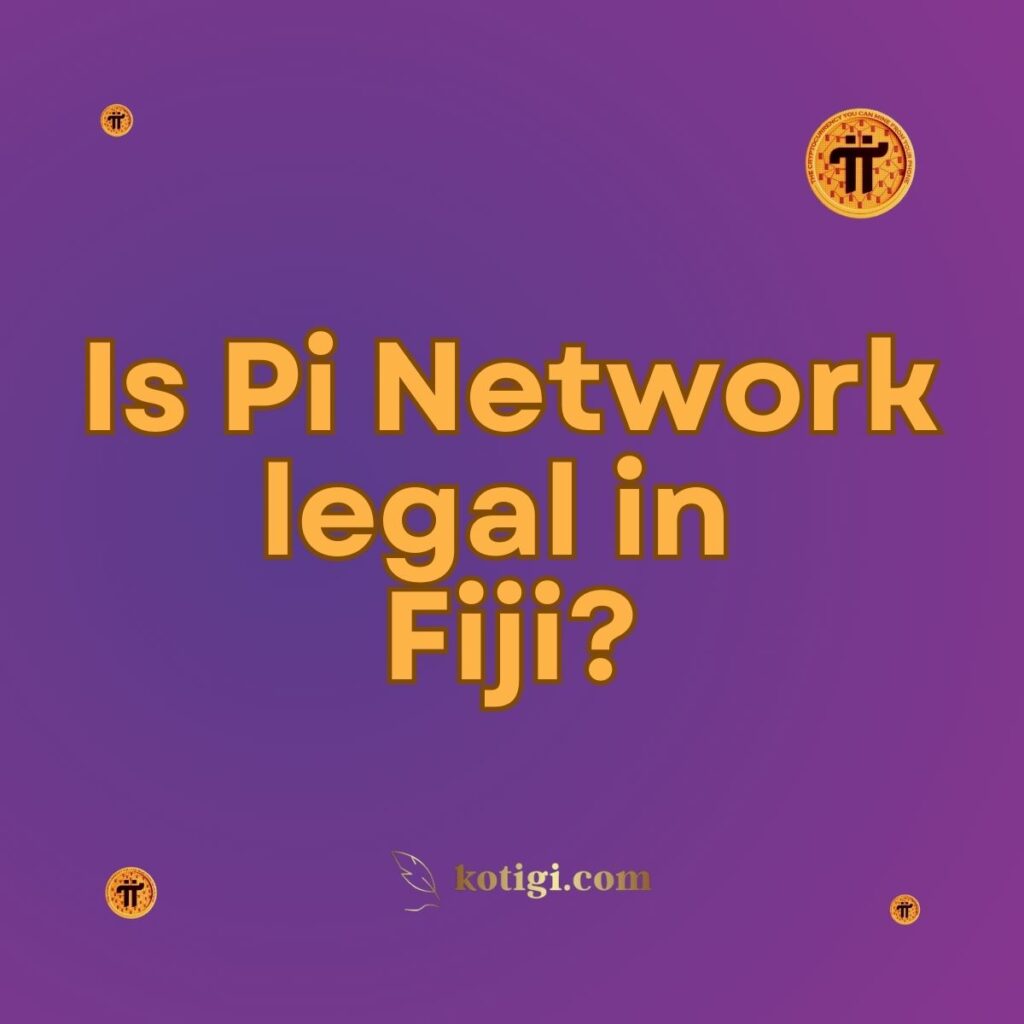
Is Pi Network legal in Fiji?
Pi Network is currently legal in Fiji, as there are no specific laws or regulations that restrict its use. Fiji has yet to establish formal regulations around cryptocurrencies, allowing users to participate in Pi Network without any legal impediments. However, Fijian users should stay informed about potential changes in the regulatory environment as global digital asset regulations evolve.
Introduction
As Pi Network continues to gain traction around the world, questions about its legal status arise in various countries, including Fiji. With a population growing more curious about cryptocurrency and blockchain technology, Fijian users are eager to understand whether they can legally participate in Pi Network’s mobile-based mining platform. This article explores the current legal status of Pi Network in Fiji, delves into the country’s regulatory approach to digital assets, and examines the potential future implications for users.
1. Cryptocurrency Regulations in Fiji
1.1 Absence of Formal Cryptocurrency Regulations
Like many other nations, Fiji has not yet developed a comprehensive regulatory framework specifically governing cryptocurrencies. The country is in the early stages of considering how digital assets might fit into its financial system. This means that, for now, users in Fiji can legally engage with Pi Network, as there are no laws prohibiting its use. However, the lack of regulation could change as Fiji’s financial authorities study the cryptocurrency landscape.
1.2 Fiji’s Stance on Digital Assets
While Fiji has not implemented concrete regulations on cryptocurrencies, it has not been dismissive of the growing influence of digital assets. The Reserve Bank of Fiji (RBF) has observed the rise of cryptocurrency adoption globally and is likely assessing its potential impact on the Fijian economy. However, no official statements or policies regarding the legal status of Pi Network or other cryptocurrencies have been issued by the RBF.
1.3 Potential for Future Regulations
As the use of cryptocurrencies expands in the Pacific region, Fiji may eventually develop a clearer regulatory framework for digital assets. This could involve guidelines around the mining, trading, and use of digital currencies, which may affect Pi Network users. While Pi Network is still in its development phase, Fijian users should remain attentive to potential regulatory shifts that could impact their involvement with the platform.
2. Pi Network’s Legal Status in Fiji
2.1 Current Legal Environment for Pi Network
Currently, there are no specific regulations in Fiji that govern the use of Pi Network or similar mobile-based cryptocurrency mining platforms. This means that users are free to mine Pi coins using the Pi Network app without facing any legal restrictions. Since Pi tokens do not yet have monetary value and cannot be traded on exchanges, they are not subject to financial regulations at this stage.
2.2 Impact of Future Cryptocurrency Laws
While Pi Network users in Fiji currently operate in a legal grey area, future cryptocurrency laws could change the landscape. If Fiji introduces regulations aimed at cryptocurrency exchanges or digital asset platforms, Pi Network may come under closer scrutiny. This could involve Know Your Customer (KYC) requirements, Anti-Money Laundering (AML) protocols, and other compliance measures that users may need to follow.
2.3 Tax Considerations for Fijian Users
At present, there are no specific tax policies in Fiji targeting cryptocurrency activities such as mining. This means that users mining Pi Network tokens do not need to worry about immediate tax obligations. However, as Pi evolves and gains value, Fiji’s government may consider taxing cryptocurrency earnings, particularly if Pi tokens become tradeable assets. Users should keep track of any income or gains related to Pi tokens and be prepared for potential taxation in the future.
3. Risks and Challenges for Pi Network Users in Fiji
3.1 Regulatory Uncertainty
One of the main risks facing Pi Network users in Fiji is the uncertainty surrounding cryptocurrency regulation. Since there are no explicit laws governing Pi Network or similar platforms, users may be exposed to future regulatory changes that could affect their participation. Staying informed about Fiji’s stance on cryptocurrencies will help users avoid any legal challenges.
3.2 Future Changes in Cryptocurrency Policies
As global interest in cryptocurrencies grows, Fiji may decide to develop specific policies for digital assets. This could involve stricter regulations or even restrictions on cryptocurrency mining or trading activities. Users of Pi Network should remain vigilant and ready to adapt to any changes in Fijian laws that could impact their involvement with the platform.
3.3 Potential Privacy and Security Concerns
Given the limited regulation of digital assets in Fiji, users should also be cautious about their data privacy and security when engaging with platforms like Pi Network. While the app currently does not involve financial transactions, future updates or expansions of Pi Network may involve sensitive information, requiring users to ensure their personal data is protected.
4. Opportunities for Pi Network Users in Fiji
4.1 Early Adoption of Pi Network
Fijian users have the opportunity to be early adopters of Pi Network, mining Pi tokens before they become valuable and tradeable assets. By participating in the platform at this early stage, users can accumulate Pi tokens, positioning themselves to potentially benefit from Pi’s future growth and utility within the blockchain ecosystem.
4.2 Potential for Digital Inclusion
In a country like Fiji, where access to traditional financial services may be limited for some individuals, Pi Network offers an accessible alternative. The platform allows users to mine cryptocurrency on their smartphones, enabling greater financial inclusion and providing a gateway to the global digital economy. As Pi Network develops further, it could become a valuable tool for Fijians seeking to engage with cryptocurrency and blockchain technology.
4.3 Engaging with a Global Blockchain Community
Pi Network fosters a decentralized, community-driven ecosystem, allowing users from Fiji to connect with a global network of cryptocurrency enthusiasts and developers. This global interaction can inspire innovation and collaboration, potentially leading to local developments and blockchain-based projects that could benefit Fijian society.
5. The Future of Pi Network in Fiji
5.1 Potential for Pi Token Adoption
As Pi Network transitions to a fully decentralized blockchain, Pi tokens could gain value and become tradeable on exchanges. This could create opportunities for digital payments, cross-border remittances, and even local commerce in Fiji. The success of Pi Network will depend on the platform’s ability to build real-world use cases for Pi tokens, and Fijian users could play a role in driving adoption.
5.2 Integration with Fiji’s Financial Systems
If Pi tokens gain widespread adoption, there may be opportunities for integration with Fiji’s financial systems. Local businesses could potentially accept Pi tokens as a form of payment, and Fijian developers might explore ways to build applications using Pi’s blockchain infrastructure. This integration could contribute to financial innovation and support Fiji’s growing digital economy.
5.3 Navigating Future Regulations
As cryptocurrencies become more prominent in the global economy, Fiji’s government is likely to introduce regulations that will affect digital assets. Pi Network users in Fiji should be prepared for these changes and ensure they comply with any new requirements. Understanding how these regulations will impact Pi Network’s operations and users in the country will be essential for navigating the evolving legal landscape.
Conclusion
Pi Network is currently legal in Fiji, with no specific laws regulating its use. Fijian users can freely participate in Pi Network’s mobile mining platform without legal restrictions, although they should remain mindful of the potential for future regulatory developments. As Pi Network evolves and its tokens become tradeable, the legal environment in Fiji may shift, requiring users to comply with new regulations. By staying informed and engaged, Pi Network users in Fiji can take advantage of the opportunities presented by this growing platform.
Key Takeaways
- Pi Network is legal in Fiji, with no specific laws regulating its use at this time.
- The Reserve Bank of Fiji has not issued formal cryptocurrency policies, but users should monitor potential future regulations.
- There are no current tax obligations for mining Pi tokens, though future tax policies could be introduced as Pi tokens gain value.
- Pi Network offers an opportunity for early adopters in Fiji, allowing users to mine tokens and potentially benefit from future developments.
- Fijian users should remain aware of global and local regulatory trends, as they may affect Pi Network’s legal status and operations in the country.





